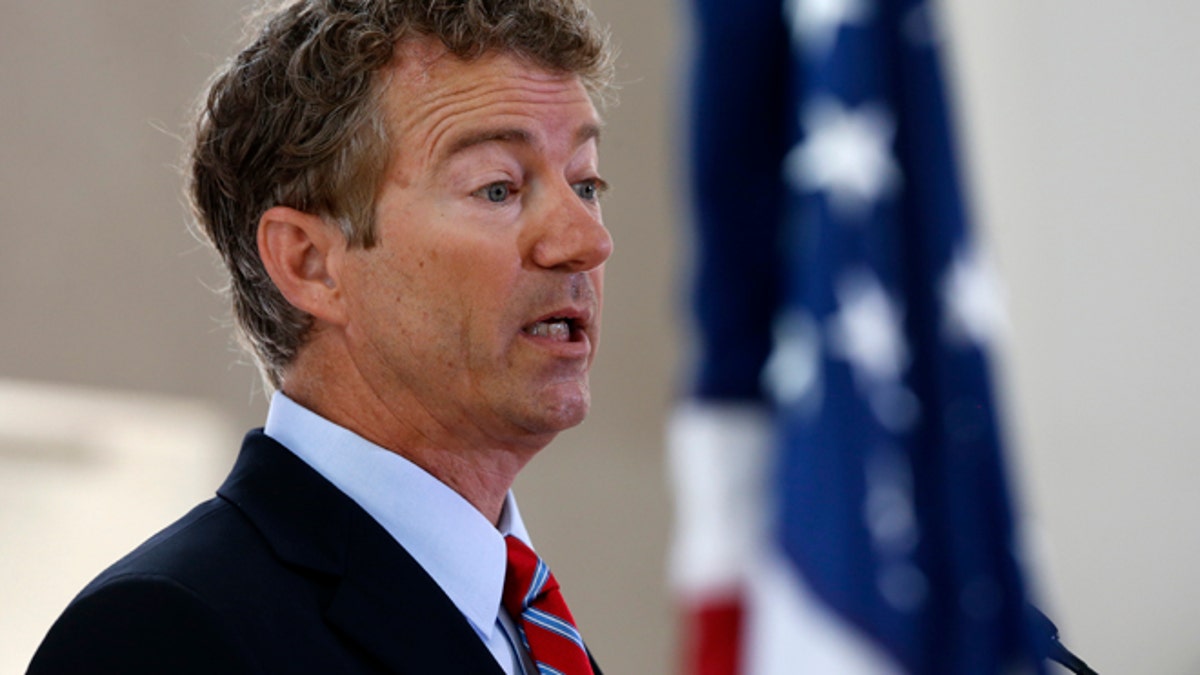
Sen. Rand Paul (AP)
Also...
Adding Insult to Injury
Rand Paul, the ACLU and the Media’s Fascination with an Unorthodox Republican
Here’s a head-spinning moment.
Rand Paul wrote the following in yesterday’s New York Times: “I agree with the ACLU.”
And that’s just the latest evidence that he is planning a different kind of Republican presidential campaign.
The Kentucky senator is quite consciously reaching out beyond the usual, staunchly conservative GOP base. That may reflect his analysis of what a Republican needs to do to win the White House in 2016. It may reflect the latitude he has as the son of perennial candidate Ron Paul. Or it may just be who he is.
My sense is that Paul is winning grudging respect in the media for going outside the usual Republican comfort zone—or at least gratitude for livening things up.
He is zigging while others are zagging, as we see in an interview the senator gave the Times the other day:
“Senator Rand Paul of Kentucky broke Friday with fellow Republicans who have pushed for stricter voting laws as a way to crack down on fraud at the polls, saying that the focus on such measures alienates and insults African-Americans and hurts the party.
“‘Everybody’s gone completely crazy on this voter ID thing,’ Mr. Paul said in an interview. ‘I think it’s wrong for Republicans to go too crazy on this issue because it’s offending people.’”
Now the argument that voter fraud is rampant has become a staple of Republican rhetoric, despite the lack of evidence that it is a major problem. Democrats, for their part, see it as an effort to disenfranchise minorities. And here is Rand Paul saying Republicans are angering black voters by going “crazy” over the issue.
Paul spoke to students at Berkeley back in March, playing up his criticism of the NSA’s surveillance programs. And he told the Times: "The first African-American president ought to be a little more conscious of the fact of what has happened with the abuses of domestic spying. Martin Luther King was spied upon, civil rights leaders were spied upon, Muhammad Ali was spied upon, antiwar protesters were spied upon."
This brought him some flak from the right. “Rand Paul, of course, did not tell the Berkeley crowd he is staunchly pro-life or thinks marriage should be limited to ‘one man and one woman,”’ wrote conservative Washington Post blogger Jennifer Rubin.
“He did not revisit his skepticism about civil rights legislation, nor did he detail his budget ideas that would repeal Obamacare and eliminate the departments of Commerce, Education, Energy and Housing and Urban Development. Although he talked to students about civil liberties, he omitted mention of his staunch opposition to any form of gun regulation. For him freedom means coal plants, oil companies and pipeline manufacturers should be freed from the heavy hand of government. He has not made that pitch at Berkeley. In a very real sense, he is trying to pull a fast one on students, concealing his views on a majority of issues while trying to snag them with some anti-government trinkets on national security.”
Government surveillance is one of those issues that unites critics on the right and the left. So is the Obama administration’s drone warfare policy, the subject of Paul’s 13-hour filibuster that helped put him on the political map last year and which he trumpeted in a Washington Post opinion piece.
Drones are the subject of Paul’s Times op-ed, which he cloaks in a demand for more information about one of the president’s judicial nominees, David Barron, a former Justice official under Obama who wrote two memos justifying a drone-delivered death sentence without trial:
“I believe that killing an American citizen without a trial is an extraordinary concept and deserves serious debate. I can’t imagine appointing someone to the federal bench, one level below the Supreme Court, without fully understanding that person’s views concerning the extrajudicial killing of American citizens.”
Then comes the brief bow to the left: “I agree with the A.C.L.U. that ‘no senator can meaningfully carry out his or her constitutional obligation to provide ‘advice and consent’ on this nomination to a lifetime position as a federal appellate judge without being able to read Mr. Barron’s most important and consequential legal writing.’”
I’m accustomed to seeing Republican candidates position themselves to the right, a la Mitt Romney, as primary season approaches. And Paul is solidly conservative, although his isolationist instincts on foreign policy could put him at odds with many party activists.
At Salon, Heather Digby Parton says foreign policy is a “big challenge” for Paul. “He must keep the libertarian base that will provide his greatest financial support. And they are also likely to be the ones who show up in the early primary and caucus states. He needs them to be his foot soldiers. But he will never get enough Republicans to vote for someone they see as a dove.”
But Paul is making nods to the center and openly bemoaning the fact that the GOP tent has gotten too small.
We have yet to see how Rand Paul holds up under the searing media scrutiny that accompanies a presidential campaign, including his past statements on, for instance, the Civil Rights Act and a former campaign aide with a history of racially inflammatory comments. But in 2014, at least, he is separating himself from the Ted Cruz crowd in interesting ways.
Adding Insult to Injury
National Review’s Ramesh Ponnuru says he wrote a piece for the Washington Post’s Sunday opinion section, that the editors added an error without running it by him, blew off the change as minor, and then the paper ran two letters criticizing the mistake. Now that hurts.




